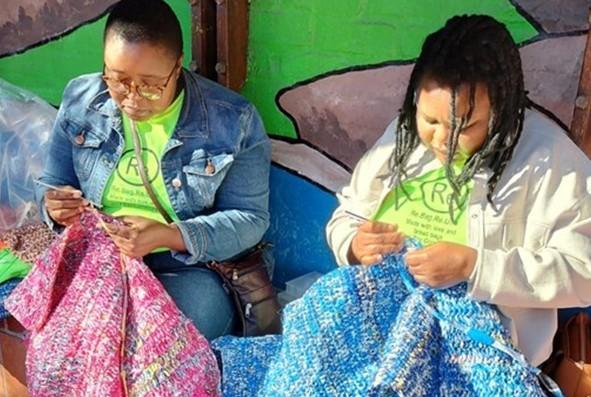Caption: Cousins Sakile Ndlovu (left) and Mejury Kazingizi (right) crochet side by side at a Saturday morning Re.Bag.Re.Use meetup. Sakile introduced Mejury to the initiative as a cutter. Today, both women transform plastic waste into beautiful, handcrafted, multifunctional pieces of purpose, inspiring others, stitch by stitch.
From Cutting Plastic to Crocheting Change
As World Environment Day approaches on 5 June, Re.Bag.Re.Use is proud to spotlight the power of turning waste into worth. This creative community initiative, based in Hout Bay, brings together 21 women: 15 crocheters and six cutters who repurpose discarded plastic bags into beautiful, multifunctional items.
Since launching just over four years ago, the team has repurposed the equivalent of 144,000 empty bread bags. That adds up to approximately 1,009 kilograms of plastic saved from ending up in landfills or the environment. For perspective, that is more than eight baby elephants in weight.
Mejury Kazingizi was introduced to the Re.Bag.Re.Use team as a cutter by her cousin, Sakile Ndlovu. She began by meticulously cutting plastic strips for the crocheters. Learning and growing is key to the initiative, and all cutters are encouraged to learn how to crochet. At first, Mejury was hesitant. She steered away from the crochet needle, unsure of her ability. But slowly, she began to experiment, tried new projects, and built up her confidence. Today, her hands skilfully crochet recycled bread bags into beautiful, purposeful creations. In fact, when you watch the Re.Bag.Re.Use ‘How to crochet’ tutorials on social media, proudly sponsored by Blue Ribbon, it is Mejury’s hands you see. She is now teaching and inspiring the next generation of upcyclers.
Caption: Through the lens: Mejury Kazingizi demonstrates how to prepare and crochet plastic yarn (plarn) from Blue Ribbon bread bags for Re.Bag.Re.Use’s tutorial series on how to crochet. Her hands, once used only for cutting plastic, now teach others how to craft change, one recycled strand at a time.
Her transformation is best told in her own words shared with the team: “Those hands couldn’t hold a crochet needle. They only knew how to cut plastic. Thank you team. Today, those same hands are making beautiful crocheting.”
Turning Waste into Wonder
Plastic pollution is a mounting crisis, but initiatives like Re.Bag.Re.Use show how a bit of creativity can go a long way. The Hout Bay-based initiative collects empty bread bags and shopping bags that would otherwise clog landfills or pollute the environment.
Every bread bag saved through upcycling does more than just avoid landfill. It supports someone’s growth. It offers dignity, income, and a sense of purpose.
True sustainability is not only about recycling. It is about reducing, reusing and repurposing to create lasting environmental and social impact. Re.Bag.Re.Use embodies this ethos, proving that a cleaner planet and stronger communities can be crocheted together, one bag at a time.
Crafting Calm and Confidence
Beyond the environmental impact, Mejury and her fellow Re.Bag.Re.Use artisans have discovered a deeply personal benefit to their craft. For many of them, crochet is therapy. The rhythmic looping of plarn, has become a calming part of their daily lives.
Studies support what these women experience firsthand. Repetitive needlework can boost serotonin, the feel-good hormone, and help reduce cortisol, the hormone linked to stress. Many of the Re.Bag.Re.Use team say that focusing on creating a bag or a hat from plastic waste helps them tune out life’s anxieties. The concentration and care required in crocheting provide a meditative escape.
Just as importantly, learning this craft has fuelled the women’s self-confidence. Every completed item, whether a vibrant beach bag or a durable doormat, is a visible reminder of creativity, growth and pride.
If you would like to learn how to crochet, visit www.rebagreuse.com to get your plarn starter kit. You can follow the tutorials on Re.Bag.Re.Use’s social media pages: Instagram, Facebook or TikTok.
